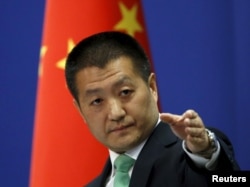A top Taiwanese official on Wednesday said Taipei may send a delegation to Beijing to learn more about a fraud trial involving some 45 Taiwanese nationals who were deported from Kenya and sent to mainland China against their wishes.
Taipei has accused China of abducting the group, which faced accusations in Kenya of committing telecommunications fraud. Analysts say Beijing may be trying to force the soon-to-be ruling party in Taiwan to start a friendly dialogue with mainland China, rather than veering toward stronger self-rule, which goes against Beijing's wishes.
"For this kind of case, I must say that we will try to get our citizens back [to Taipei] for trial," Andrew Hsia, who heads the island's Mainland Affairs Council (MAC), told VOA's Mandarin Service. "But China will contend, too, since the victims are already over there. So both sides will coordinate on the basis of judiciary assistance."
Hsia also said there used to be cross-strait cooperation and a tacit understanding between the two sides in dealing with similar cases. If mainland China thinks a sentence for fraud in Taiwan is not heavy enough, he said, there would be room for discussion.
The deportations that Taiwan’s government describes as an abduction of its citizens that was coordinated by China and Kenya follows other moves that analysts call pressure tactics against Taiwan since the island’s January 16 presidential election.
China has considered Taiwan as part of its territory since the Communists won the Chinese civil war of the 1940s and insists that the two sides eventually unify. Taiwan’s Nationalist government of the past eight years has set aside differences to negotiate a series of deals with China, which in turn has dropped its overt hostility of the past.
Pressure on DPP
But Beijing has no such relationship with the Democratic Progressive Party of President-elect Tsai Ing-wen. Her party advocates stronger autonomy for Taiwan, meaning more distance from China.
Since Tsai’s election, Beijing has scaled back permits for Chinese tourists to Taiwan, according to a government report in March. Also last month it established diplomatic ties with The Gambia, a former Taiwan ally in Africa. This month, Chinese buyers suspended a five-year deal to import milkfish from Taiwan.
“I can't help but suspect that there are political motivations. These signals are adding up,” said Bonnie Glaser, a senior adviser with the Center for Strategic and International Studies in Washington. “I think the Chinese are laying down markers for Tsai and the Democratic Progressive Party of what is likely to follow if she doesn't say the magic words ‘one China.’”
On Friday Kenyan authorities ordered eight Taiwanese people to fly to China despite their pleas to return to Taiwan. Kenya deported another 37 to China on Tuesday. A Kenyan court had ordered them out of the country on suspicion of telecommunications fraud, though a court had cleared 22 of unlicensed telecom equipment use.
Lawsuits threatened
The island’s top China policymaker Andrew Hsia called his counterpart in Beijing on a hotline Tuesday, and the government in Taipei says it plans to sue three government agencies in Kenya.
“Minister Hsia said on the hotline call that the mainland Chinese side had violated the rights of our citizens, generating criticism from outside of Taiwan-mainland China relations,” says Yang Chia-chun, spokesman for Hsia’s ministry, the Mainland Affairs Council. “For the mainland side in Kenya to force 37 citizens on Tuesday to mainland China, our side asserts that the mainland has severely harmed eight years of mutual trust.”
Kenya’s home affairs ministry spokesman Mwenda Njoka told VOA the Taiwanese were sent to China because they entered from China. “They came through China, so let them go back there,” he said. “Let them deal with China. That is their problem.”
“I think China is trying to force the new government to negotiate with the Chinese authorities,” says Alex Chiang, international relations professor at National Chengchi University in Taipei, speaking of the Kenya case. “This is going to be a long process.”
One China
Tsai has said she wants dialogue, but disputes Beijing’s precondition that each side see itself as part of a single China. She will take office May 20.
“My first thought was this may be a diabolically clever method discovered by Beijing to simultaneously reinforce its claim to sovereignty over the people of Taiwan and also make it harder for [Taiwan’s] citizens to do business overseas, putting more pressure on Taipei to make a deal with Beijing,” says Denny Roy, senior fellow at the East-West Center think tank in Honolulu.
Chinese foreign ministry spokesman Lu Kang commended Kenya for following Beijing’s “one-China” policy, meaning its actions showed Taiwan and China belong to one country. “
“The ‘one-China’ policy is an important precondition for bilateral relations with China and other countries,” he told a scheduled media briefing this week. “We commend Kenya for its upholding of this policy.”
Right to trial
Beijing may just be asserting the right to try Taiwanese in its courts, said George Tsai, a retired university political science professor in Taipei.
“It’s a very controversial issue,” he said. But for the Taiwanese, he added, “from a human rights point of view, they’re entitled to a fair trial.”
China’s state-backed Global Times newspaper said in a commentary Tuesday that because the Taiwanese still face “charges of fraud,” adding it was legal under international law to “extradite” them.
“It is not news that some Taiwanese involve themselves in telecommunications fraud, with mostly mainland people as victims,” the commentary says. “It is indisputable…that the Chinese mainland can extradite the eight Taiwanese involved in the fraud charges.”
But the mother of one of the men deported to China was quoted by Taiwan’s Apple Daily newspaper as saying her son was a music professional who had visited Kenya for pleasure with a friend.






